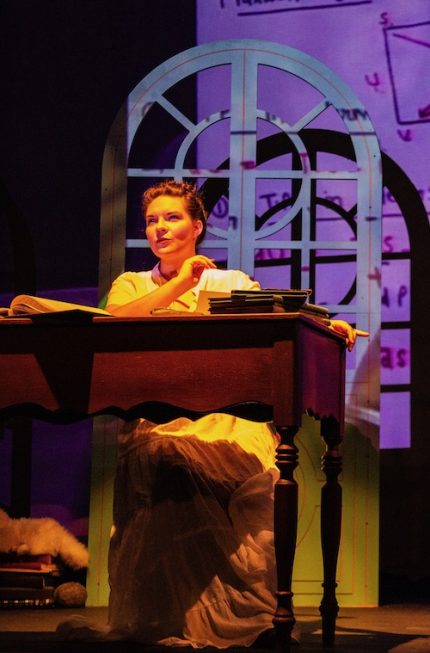Third Eye Theatre’s double bill celebrates women tech pioneers

Chicago opera lovers were spoiled for choice this weekend between Lyric Opera’s season-opening production of Macbeth, Haymarket Opera’s streaming Orlando, and Chicago Opera Theater’s gender-bending Carmen.
Representing Chicago’s vibrant storefront opera scene, Third Eye Theatre Ensemble presented a double-header of operas by and about women Saturday night at the Edge Theater in Andersonville.
Petticoats & Sliderules was written this year by Chicago-based composer and singer, Elizabeth Rudolph. Written for two voices, violin, and cello, this operatic miniature is inspired by Lois Graham, the first American woman to earn a PhD in Mechanical Engineering in 1956, and Elizabeth Woodbridge (Morris), a suffragette and one of the first women to earn a PhD from Yale in 1908.
Rudolph sets the pioneering women’s words as a musical dialogue that bridges decades. The title comes from a tongue-in-cheek suggestion for the name of the society Graham helped to found, the Society for Women Engineers. The two women describe the barriers and sexism they have faced in getting where they are, demonstrating both how far we have come in the last century and how far there is still to go.
Rudolph’s music is decidedly post-minimalistic, characterized by complex rhythms and repeated figures. This mechanized style suited the subject matter, especially as binary code scrolled across the screen behind the two soloists. Though contemporary, the vocal writing was singable and allowed for clarity of text even when the two voices sang different words simultaneously.
As usual with this company, the performances are using alternating casts. Soprano Angela Born sang the role of Elisabeth Woodbridge on Saturday, bringing an engaging stage presence and expressive lyric voice to the role. Lois Graham was sung by mezzo-soprano Molly Burke. A vocal standout of the evening, Burke sang with a clear, colorful tone, excellent diction, and musical sensitivity. The two voices complemented each other nicely, particularly when they came together to sing “We can do anything” in unison at the end of the piece.
The second half of the evening brought The Infinite Energy of Ada Lovelace, a one-act work by Kamala Sankaram with a libretto by Rob Handel. (Sankaram’s Taking Up Serpents was presented in a streamed performance by COT in February.)
The 2019 opera centers on Ada Lovelace, who is often credited as the first computer programmer even though she died more than a century before computers were invented. The daughter of poet Lord Byron, whose life was shrouded in scandal, Lovelace has to choose between going to London to assist Charles Babbage in developing his “difference engine” (the precursor to the computer) or being a dutiful homemaker and staying with her family, thus shielding them from further dishonor.
Although Sankaram also makes frequent use of minimalist textures to highlight the protagonist’s mathematical mind, her eclectic style is more difficult to pin down, with elements of blues, jazz, pop, waltz, romanticism, and even the baroque infusing the score. Conductor Alexandra Enyart led the string quartet and piano through the rhythmically complex and stylistically varied score with assuredness and supported the singers well through some difficult entrances.
Rena Ahmed led the cast as Ada. On Saturday it seemed that the mezzo-soprano may have been under the weather, as she transposed much of the role down an octave (judging by excerpts of the premiere on the composer’s website). Further, Ahmed sang in a musical-theater-style chest voice that, while pleasant, was difficult to hear and comprehend when she was in duet with other characters. She also seemed preoccupied by the musical and vocal demands of the role, which detracted slightly from her characterization.
Tenor Max Hosmer played William King-Noel, Ada Lovelace’s husband. Hosmer’s lovely high tenor voice made him especially sympathetic in his aria where he grappled with Ada’s brilliance and what was expected of a wife at that time. The strange, tai-chi-like choreography, which made frequent appearances in both operas, distracted a bit from his skillful singing in the aria, particularly when he had to stand on one leg mid-motion during a high note.
Another vocal standout was baritone Noah Gartner as the enthusiastic inventor Charles Babbage. He inflected every line with musicality and lifted the score off the page, not always an easy task in contemporary opera.
Soprano Katherine Bruton played a fiery Harriet Beecher Stowe, who had come to London to interview Ada for her book on Lord Byron. (William refuses to let her interview Ada, which would further embroil his family in scandal.) Bruton brought a powerful soprano voice and vibrant characterization to the role. Rounding out the small cast were Matthew Peckham as the Butler and Tracey Lynne Furling as the nanny, who provided moments of comedic relief.
The Edge Theater proved a small but comfortable venue. Though the orchestra played from the stage, director Rose Freeman made good use of the rest of the space—enhancing the action with the tactful use of a screen projecting images of code and black-and-white pixels behind the actors. The lighting during the scene in which Babbage shows Ada his difference engine was especially magical.
In her program note, Freeman encouraged the audience to closely scrutinize the men in the stories, writing “I have had enough of calling women to action and power. It is not enough for men to open the doors and offer a seat at the table or tolerate their wives going to work.”
Ironically, despite her comments it is the male characters in The Infinite Energy of Ada Lovelace that are most sympathetic and multidimensional, at least in this production.
Third Eye Theatre Ensemble’s double-bill runs through October 3. thirdeyete.com
Posted in Uncategorized

